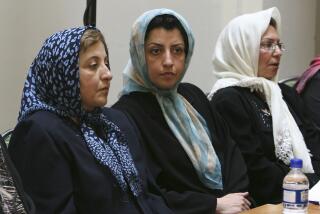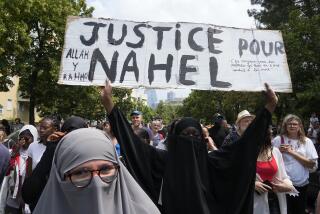Hunger Strikers Line a Sunny Lane in France
- Share via
AUVERS-SUR-OISE, France -- The politics of war and terrorism have invaded Rue de Gordes, a sunny lane in this town where Van Gogh spent his last months and was laid to rest.
Weakened by a hunger strike, dozens of Iranian protesters slump alongside walls lining the narrow street. They are tended to by women wrapped in Islamic head scarves, and by teenage girls with blond-tinted hair, jeans and T-shirts bearing photos of their leader, Maryam Rajavi.
Brawny French riot policemen keep watch, mindful that more than a dozen militants have immolated themselves to protest the arrest on terrorism charges of Rajavi, a leader of the Moujahedeen Kalq, or MEK, the biggest armed resistance group opposing Iran’s Islamic government.
“The immolations happened because they see her as a symbol of hope that has been taken away from them,” says Shahin Gobadi of the National Council of Resistance of Iran, the group’s political wing. “It shows the level of their outrage.”
But French officials say the human torches on the streets of Paris, London and Rome illustrate the violent nature of a sectlike organization that blends Marxism and Islam. The fall of Saddam Hussein deprived the MEK of military bases in Iraq and of a major financier, increasing the danger that they would resort to terrorist acts against Iranian targets in Europe, according to French officials.
The group has operated in France since 1986. But official tolerance ended June 17 when an army of 1,300 police officers -- a SWAT team, riot squads, financial investigators -- stormed the compound of five villas here. They made 159 arrests and later arraigned Rajavi and 16 others on suspicion of conspiracy and financing terrorism. Eleven of the suspects remain in custody.
Police also confiscated computers, high-tech communications gear and about $9 million in cash. They found stacks of U.S. currency that allegedly came from donors in Saudi Arabia and Yemen, according to a senior French official who spoke on condition of anonymity. The United States and the European Union have designated the MEK a terrorist organization.
U.S. investigators are helping their French counterparts trace the source of the money and its intended use, the senior French official said. Saudi Arabia and Yemen are U.S. allies, but both have been pressured by the West to do more against terrorist activity.
“The question now is why was money coming from Saudi Arabia and Yemen?” the official said. “We are investigating that. We know that the Moujahedeen’s military command had retreated here from Iraq and was turning France into their world headquarters. There was intelligence information that they were preparing attacks in Europe. That was why we acted.”
The crackdown must also be seen in the context of Paris’ relationships with Washington and Tehran. Despite the loud diplomatic dispute over the Iraq war, the case shows that French-U.S. cooperation continues on security matters.
State Department officials praised the French raid. The FBI and CIA contributed to a two-year investigation of the Iranian group, examining finance and support networks in California and elsewhere in the United States, according to the senior official and others familiar with the case.
By confronting a group that has posed an armed threat to the Iranian government but has little support in Iran’s domestic pro-democracy movement, France is also reinforcing a campaign urging Iran to permit inspections of its nuclear program and to get tough with Al Qaeda operatives in its territory.
“I think the reasons given by the French government are true, but do not explain everything,” said Olivier Roy, a Middle East expert at the National Center for Scientific Research in Paris. “It is saying to Iran, ‘Very well, we take seriously the threat against you. But in exchange, we want progress on the nuclear inspections and on the possible presence of Al Qaeda.’ ”
Geopolitics aside, French authorities will have to prove that MEK posed a concrete threat justifying the massive police operation ordered by Jean-Louis Bruguiere, France’s top anti- terrorist magistrate.
French investigators have determined that Auvers-sur-Oise was a hub where terrorist attacks in Iran were financed, planned and supervised with the aid of sophisticated technology, according to the senior French official. Fighters were sometimes dispatched from Paris on missions to Iran, according to the official.
Members of the group’s political wing say they are stunned. Only three days before Rajavi’s arrest, they say, police bodyguards accompanied her to a medical appointment, a service routinely provided by France’s Interior Ministry because of the potential threat from the Iranian government.
Ravaji’s supporters argue they have carried out only legitimate guerrilla actions against an Islamic dictatorship in Iran they assert sponsors terrorism. They say the MEK has never committed violent acts in Europe despite attacks by Iranian spies, who they claim assassinated a brother of Rajavi’s husband, Massoud, in Geneva in 1990.
The hunger strikers allege that the French government has cut a cynical deal to preserve France’s clout in Iran.
“There are many French companies doing business with Iran,” said Aladdin Touran, an engineer from Cologne, Germany, who came here to join militants from across Europe and as far away as Berkeley participating in the hunger strike. “Commercial ties and contacts have always been pivotal for Europe.... European politics are pushed by economic benefits. And there is some feeling that the French, being kicked out of Iraq, want to protect themselves in Iran.”
Before the arrests in France, U.S. troops disarmed MEK guerrillas in Iraq. The recent actions against the Iranian opposition group have greatly damaged the organization, which revolves around the personalities of Rajavi, 50, and her husband.
Massoud Rajavi, 55, is officially the military leader, and his wife is the political leader. The group says she will lead a democratic transition in the event the current regime falls. Massoud Rajavi’s followers say he remains in action along the Iran-Iraq border, although others say his whereabouts are unclear.
The Moujahedeen Khalq was formed in the 1960s. U.S. officials say the group took part in violence that killed U.S. citizens; the dissidents deny the charge, saying those killings were carried out by Communists who had taken over the MEK at the time.
The MEK joined the Islamic Revolution against the shah of Iran, but the Rajavis soon broke with Ayatollah Ruhollah Khomeini and went into exile. With the backing of Hussein, their forces made cross-border strikes from Iraq. The group assassinated the head of Iran’s prison system in 1998 and the acting chief of the army in 2000.
The U.S. State Department declared it a terrorist group in 1997, the same year Al Qaeda received that designation. But the political wing retains friends on Capitol Hill. Gobadi, who studied nuclear engineering at UCLA and worked for the dissident group in Washington, carried copies of letters from six U.S. legislators, both Democrat and Republican, criticizing the French roundup of the MEK.
In a letter to France’s ambassador in Washington dated June 20, Sen. Sam Brownback (R-Kan.) urged France not to extradite Rajavi to Iran.
The sympathy in high places mystifies French officials and experts, who say the Rajavis exercise cultlike control over their followers. French officials also insist extradition is not even an option because Iran has the death penalty.
The self-immolations in Europe stopped after Rajavi wrote a letter in custody telling her followers to desist, officials say.
“It’s a sect,” said Antoine Sfeir, an editor of Les Cahiers de l’Orient, a Paris-based quarterly about Arab affairs. “Both the ideology and the method are Stalinist. The religion is important, but the politics are more important.”
Gobadi, gesturing at the prone forms lining Rue de Gordes, said the MEK’s members are freedom fighters.
“These people love their country, and they want it to be liberated and free,” he said. “How could it be called a sect? This has been done by the French government in order to justify and whitewash a despicable deal with the mullahs.”
More to Read
Sign up for Essential California
The most important California stories and recommendations in your inbox every morning.
You may occasionally receive promotional content from the Los Angeles Times.













